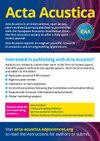Assessment of soundscapes using self-report and physiological measures
IF 1.4
3区 物理与天体物理
Q4 ACOUSTICS
引用次数: 0
Abstract
Soundscape studies evaluate the subjective and objective qualities of an environment and attempt to develop a holistic view of the interplay between the acoustic scene and the listener’s experience. Descriptors are used to express the perception of the acoustic environment, while further subjective and quantitative measures are used as indicators that represent features of the acoustic environment. The relationships between descriptors and indicators for a particular soundscape study are often identified by developing linear statistical models. This work describes an experiment to assess heart rate measures, including ultra short term heart rate variability, within the context of the predictor descriptor framework of a soundscape study. The aim of this work is to provide evidence in support of the psychophysiological basis of measures of affect in soundscape evaluation. In this study 15 participants evaluated a randomly ordered set of 8 soundscape recordings in a repeated measures directed listening experiment. Subjective evaluation of the soundscapes was performed using the self-assessment manikin and a sound classification survey. Participants’ heart rate was measured throughout the experiment with a Polar H10 ECG heart rate monitor. Statistically significant relationships were identified between indicators and descriptors that reflect results present in the literature. However, there were no significant interactions between heart rate measures and self-reported affect or classification scores. Future studies should focus on improving the selection of stimuli and the experiment methodology to boost the sensitivity of the experiment in light of small effect sizes.用自我报告和生理测量评估声景
声景研究评估环境的主观和客观品质,并试图对声景和听者体验之间的相互作用形成一个整体的看法。描述符被用来表达对声环境的感知,而进一步的主观和定量测量被用作表征声环境特征的指标。特定音景研究的描述符和指标之间的关系通常通过开发线性统计模型来确定。这项工作描述了一个实验来评估心率测量,包括超短期心率变异性,在音景研究的预测描述符框架的背景下。本研究的目的是为声景评价中情感测量的心理生理基础提供证据。在这项研究中,15名参与者在重复测量定向听力实验中评估了一组随机排序的8个音景录音。使用自评模型和声音分类调查对声景进行主观评价。在整个实验过程中,使用Polar H10 ECG心率监测器测量参与者的心率。统计显著关系之间的指标和描述符,反映目前的结果在文献中确定。然而,心率测量与自我报告的影响或分类评分之间没有显著的相互作用。未来的研究应着眼于改进刺激选择和实验方法,以提高实验在小效应量下的灵敏度。
本文章由计算机程序翻译,如有差异,请以英文原文为准。
求助全文
约1分钟内获得全文
求助全文
来源期刊

Acta Acustica
ACOUSTICS-
CiteScore
2.80
自引率
21.40%
发文量
0
审稿时长
12 weeks
期刊介绍:
Acta Acustica, the Journal of the European Acoustics Association (EAA).
After the publication of its Journal Acta Acustica from 1993 to 1995, the EAA published Acta Acustica united with Acustica from 1996 to 2019. From 2020, the EAA decided to publish a journal in full Open Access. See Article Processing charges.
Acta Acustica reports on original scientific research in acoustics and on engineering applications. The journal considers review papers, scientific papers, technical and applied papers, short communications, letters to the editor. From time to time, special issues and review articles are also published. For book reviews or doctoral thesis abstracts, please contact the Editor in Chief.
 求助内容:
求助内容: 应助结果提醒方式:
应助结果提醒方式:


